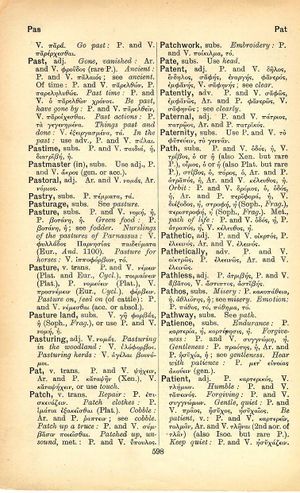pathos
τοῖς πράγμασιν γὰρ οὐχὶ θυμοῦσθαι χρεών· μέλει γὰρ αὐτοῖς οὐδέν· ἀλλ' οὑντυγχάνων τὰ πράγματ' ὀρθῶς ἂν τιθῇ, πράξει καλῶς → It does no good to rage at circumstance; events will take their course with no regard for us. But he who makes the best of those events he lights upon will not fare ill.
English > Greek (Woodhouse)
subs.
Misery: P. κακοπάθεια, ἡ. ἀθλιότης, ἡ; see misery. Emotion: P. πάθος, τό, πάθημα, τό.
Latin > English (Lewis & Short)
păthŏs: n., = πάθος,
I pathos, tender or passionate feeling: movere, Macr. S. 4, 6, 6; 13: permovere, id. 4, 6, 10.
Latin > French (Gaffiot 2016)
păthŏs, n. (πάθος), la passion, l’impression vive, l’émotion : Macr. Sat. 4, 6, 1 ; 4, 6, 10.
Latin > German (Georges)
pathos, n. (πάθος, τό), das Pathos = die Leidenschaft, der Affekt, Macr. sat. 4, 6, 1 sqq.: pathos movere, ibid. § 6 u. 13, permovere, ibid. § 10: pathos habere, ibid. § 24.

